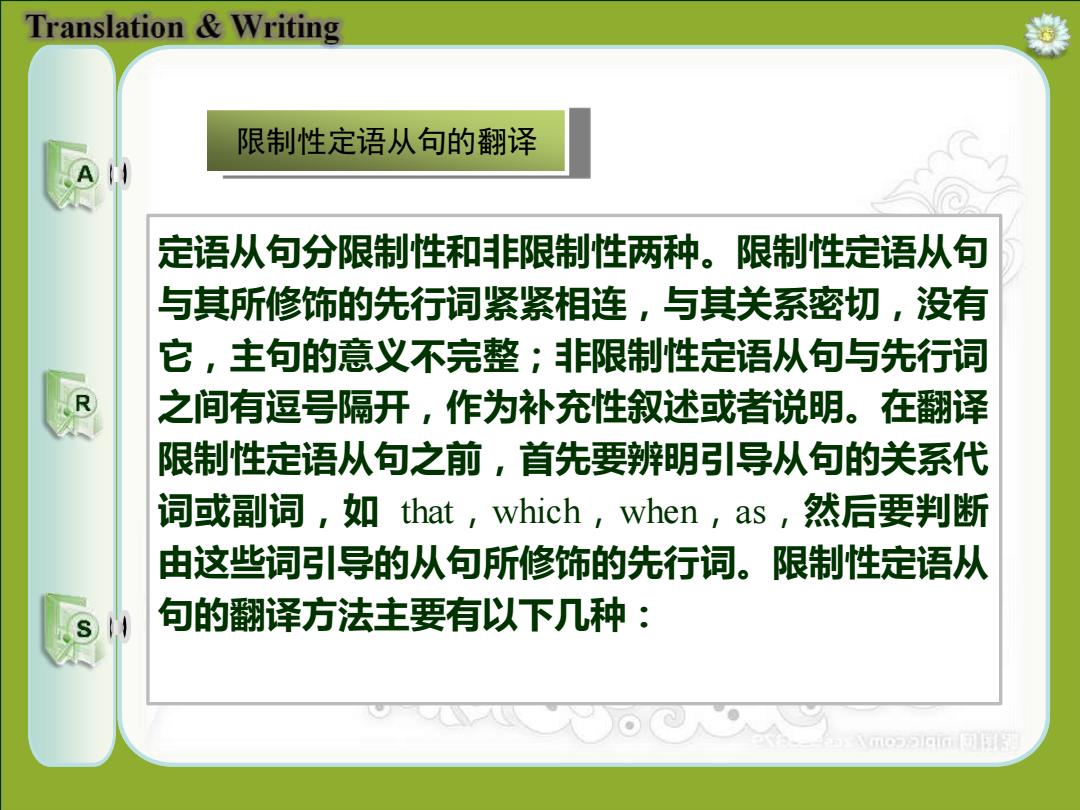
Translation Writing 限制性定语从句的翻译 定语从句分限制性和非限制性两种。限制性定语从句 与其所修饰的先行词紧紧相连,与其关系密切,没有 它,主句的意义不完整;非限制性定语从句与先行词 之间有逗号隔开,作为补充性叙述或者说明。在翻译 限制性定语从句之前,首先要辨明引导从句的关系代 词或副词,如that,which,when,as,然后要判断 由这些词引导的从句所修饰的先行词。限制性定语从 句的翻译方法主要有以下几种: mo3am同同
限制性定语从句的翻译 定语从句分限制性和非限制性两种。限制性定语从句 与其所修饰的先行词紧紧相连,与其关系密切,没有 它,主句的意义不完整;非限制性定语从句与先行词 之间有逗号隔开,作为补充性叙述或者说明。在翻译 限制性定语从句之前,首先要辨明引导从句的关系代 词或副词,如 that,which,when,as,然后要判断 由这些词引导的从句所修饰的先行词。限制性定语从 句的翻译方法主要有以下几种:
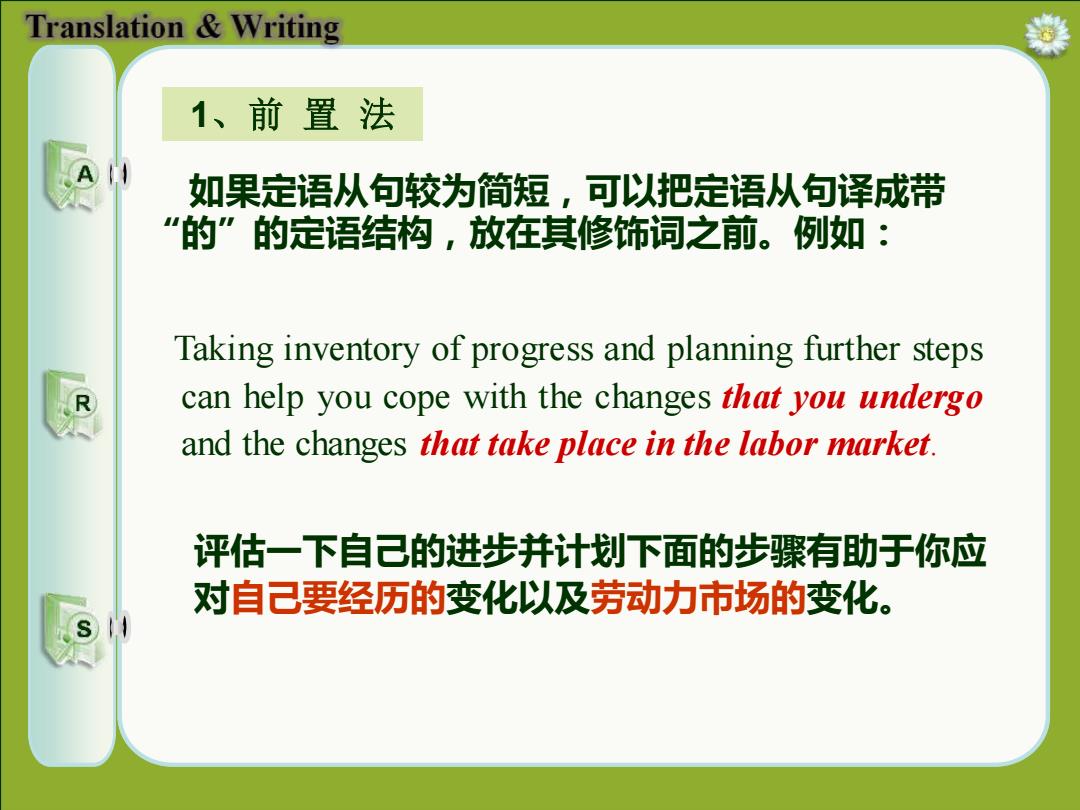
Translation Writing 1、前置法 如果定语从句较为简短,可以把定语从句译成带 “的”的定语结构,放在其修饰词之前。例如: Taking inventory of progress and planning further steps can help you cope with the changes that you undergo and the changes that take place in the labor market. 评估一下自己的进步并计划下面的步骤有助于你应 对自己要经历的变化以及劳动力市场的变化
1、前 置 法 如果定语从句较为简短,可以把定语从句译成带 “的”的定语结构,放在其修饰词之前。例如: Taking inventory of progress and planning further steps can help you cope with the changes that you undergo and the changes that take place in the labor market. 评估一下自己的进步并计划下面的步骤有助于你应 对自己要经历的变化以及劳动力市场的变化
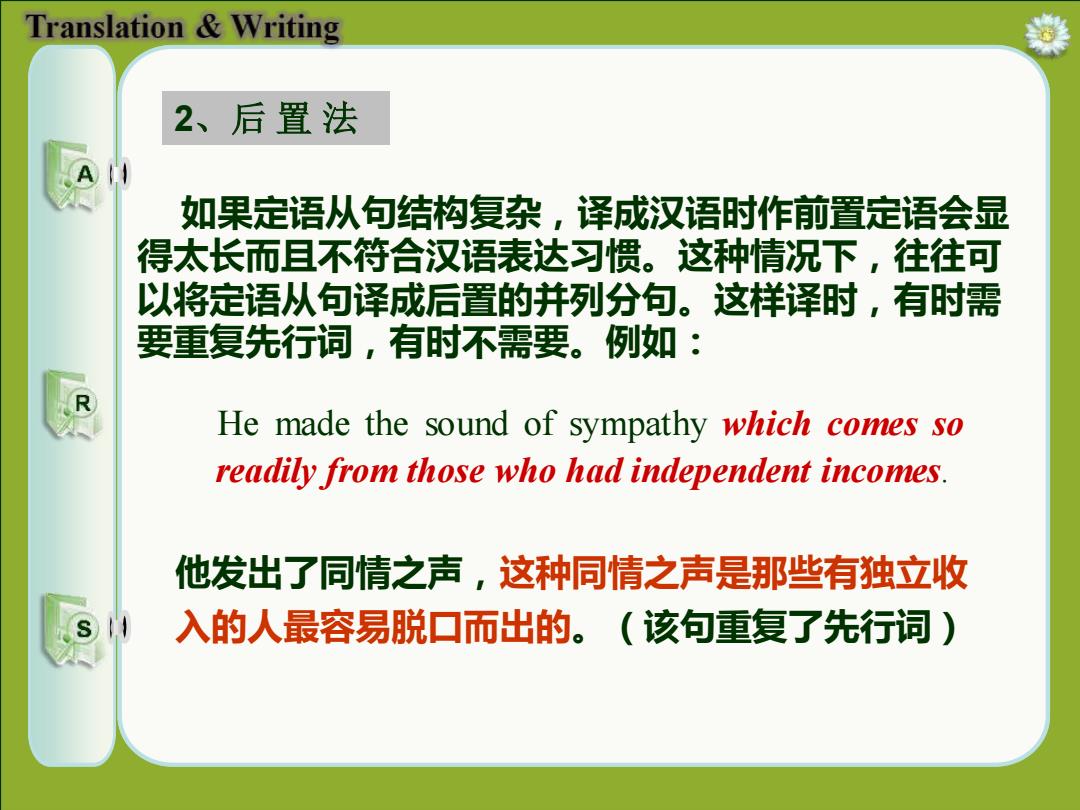
Translation Writing 2、后置法 如果定语从句结构复杂,译成汉语时作前置定语会显 得太长而且不符合汉语表达习惯。这种情况下,往往可 以将定语从句译成后置的并列分句。这样译时,有时需 要重复先行词,有时不需要。例如: He made the sound of sympathy which comes so readily from those who had independent incomes. 他发出了同情之声,这种同情之声是那些有独立收 入的人最容易脱口而出的。(该句重复了先行词)
2、后 置 法 如果定语从句结构复杂,译成汉语时作前置定语会显 得太长而且不符合汉语表达习惯。这种情况下,往往可 以将定语从句译成后置的并列分句。这样译时,有时需 要重复先行词,有时不需要。例如: He made the sound of sympathy which comes so readily from those who had independent incomes. 他发出了同情之声,这种同情之声是那些有独立收 入的人最容易脱口而出的。(该句重复了先行词)
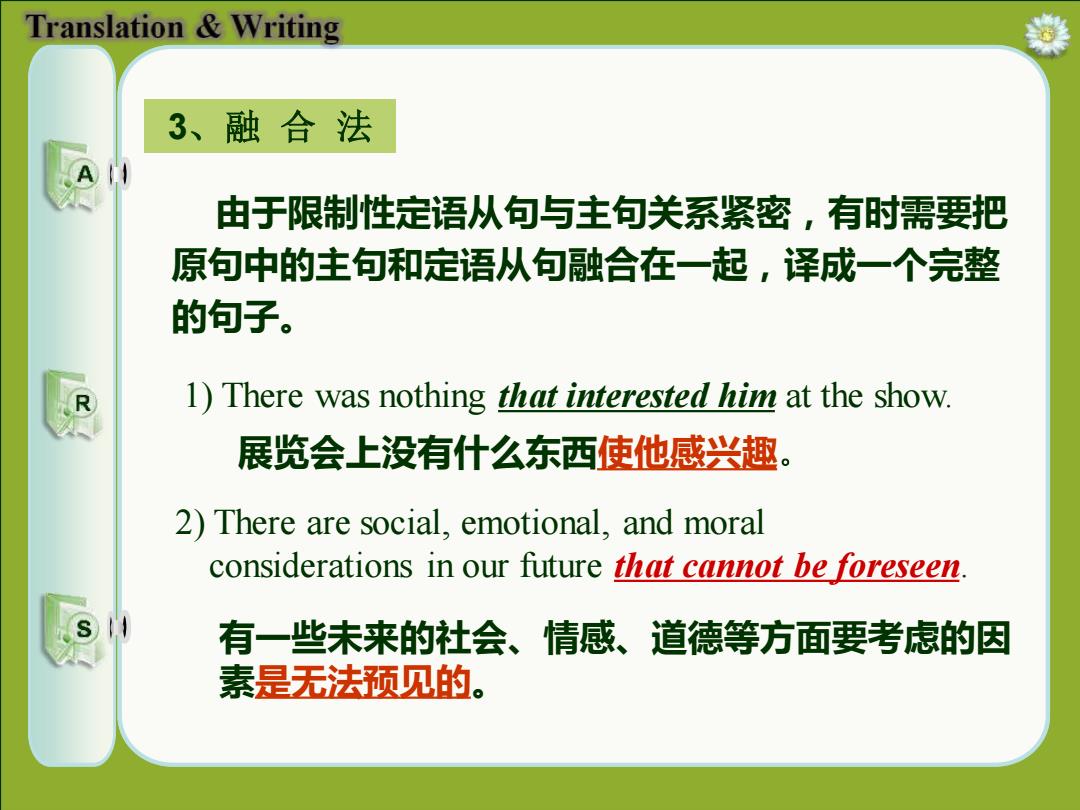
Translation Writing 3、融合法 由于限制性定语从句与主句关系紧密,有时需要把 原句中的主句和定语从句融合在一起,译成一个完整 的句子。 1)There was nothing that interested him at the show. 展览会上没有什么东西使他感兴趣。 2)There are social,emotional,and moral considerations in our future that cannot be foreseen 有一些未来的社会、情感、道德等方面要考虑的因 素是无法预见的
3、融 合 法 由于限制性定语从句与主句关系紧密,有时需要把 原句中的主句和定语从句融合在一起,译成一个完整 的句子。 1) There was nothing that interested him at the show. 展览会上没有什么东西使他感兴趣。 2) There are social, emotional, and moral considerations in our future that cannot be foreseen. 有一些未来的社会、情感、道德等方面要考虑的因 素是无法预见的
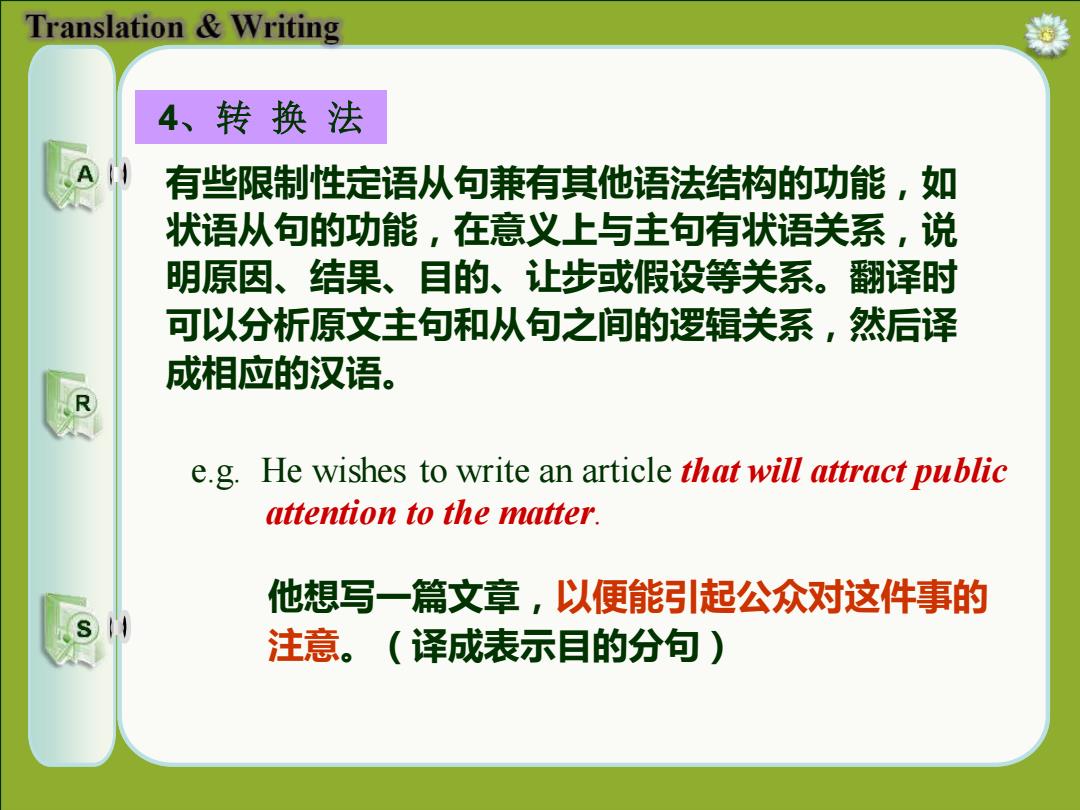
Translation Writing 4、转换法 有些限制性定语从句兼有其他语法结构的功能,如 状语从句的功能,在意义上与主句有状语关系,说 明原因、结果、目的、让步或假设等关系。翻译时 可以分析原文主句和从句之间的逻辑关系,然后译 成相应的汉语。 e.g.He wishes to write an article that will attract public attention to the matter. 他想写一篇文章,以便能引起公众对这件事的 注意。(译成表示目的分句)
4、转 换 法 有些限制性定语从句兼有其他语法结构的功能,如 状语从句的功能,在意义上与主句有状语关系,说 明原因、结果、目的、让步或假设等关系。翻译时 可以分析原文主句和从句之间的逻辑关系,然后译 成相应的汉语。 e.g. He wishes to write an article that will attract public attention to the matter. 他想写一篇文章,以便能引起公众对这件事的 注意。(译成表示目的分句)
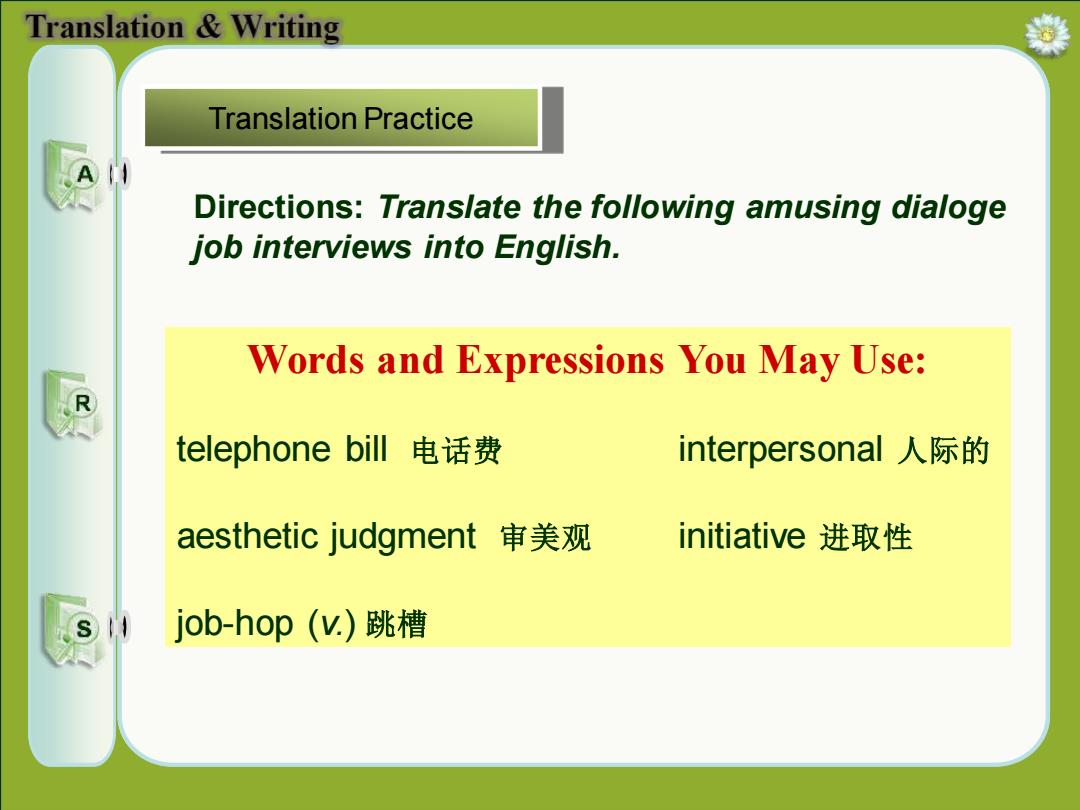
Translation Writing Translation Practice Directions:Translate the following amusing dialoge job interviews into English. Words and Expressions You May Use: telephone bill电话费 interpersonal人际的 aesthetic judgment审美观 initiative进取性 job-hop(v.)跳槽
Directions: Translate the following amusing dialoge job interviews into English. Words and Expressions You May Use: telephone bill 电话费 interpersonal 人际的 aesthetic judgment 审美观 initiative 进取性 job-hop (v.) 跳槽 Translation Practice
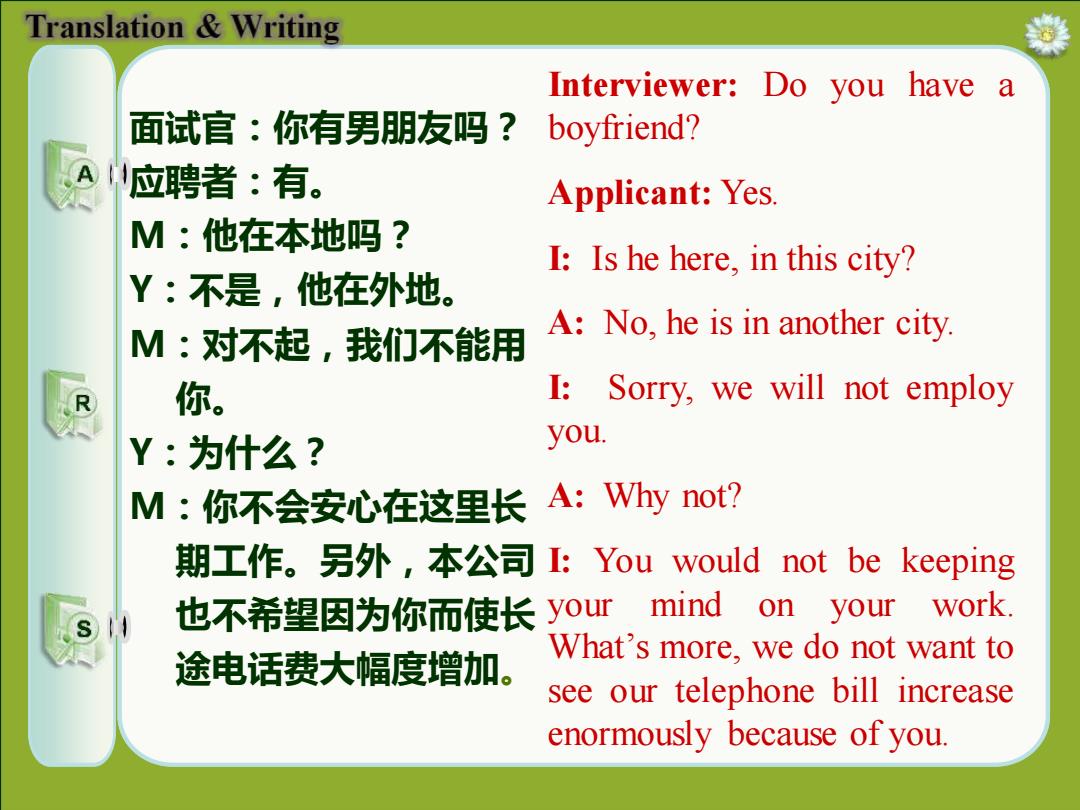
Translation Writing Interviewer:Do you have a 面试官:你有男朋友吗?boyfriend? 应聘者:有。 Applicant:Yes. M:他在本地吗? I:Is he here,in this city? Y:不是,他在外地。 M:对不起,我们不能用 A:No,he is in another city. 你。 I:Sorry,we will not employ Y:为什么? you. M:你不会安心在这里长 A:Why not? 期工作。另外,本公司上:You would not be keeping 也不希望因为你而使长your mind on your work 途电话费大幅度增加。 What's more,we do not want to see our telephone bill increase enormously because of you
Interviewer: Do you have a boyfriend? Applicant: Yes. I: Is he here, in this city? A: No, he is in another city. I: Sorry, we will not employ you. A: Why not? I: You would not be keeping your mind on your work. What’s more, we do not want to see our telephone bill increase enormously because of you. 面试官:你有男朋友吗? 应聘者:有。 M:他在本地吗? Y:不是,他在外地。 M:对不起,我们不能用 你。 Y:为什么? M:你不会安心在这里长 期工作。另外,本公司 也不希望因为你而使长 途电话费大幅度增加

Translation Writing M:你有女朋友吗? I:Do you have a girlfriend? 日Y:没有。 A:No. M:你追过女孩吗? I:Have you ever dated a girl? Y:追过,可是没追上 A:Yes,but she didn't want to date me. I:Do you want to date girls after you have a M:你工作后准备再追 job? 女孩吗? A:I will set my mind on work first.I will Y:先努力工作,暂不 not consider my marriage now. 考虑婚姻问题。 I:Sorry,we will not employ you. M:对不起,我们不能 用你。 A:Why not? 4Y:为什么? I:You are lacking in the ability of M:你公关能力欠佳, dealing with interpersonal relationships. Also,you lack self-confidence. 况且缺乏自信
M:你有女朋友吗? Y:没有。 M:你追过女孩吗? Y:追过,可是没追上 。 M:你工作后准备再追 女孩吗? Y:先努力工作,暂不 考虑婚姻问题。 M:对不起,我们不能 用你。 Y:为什么? M:你公关能力欠佳, 况且缺乏自信。 I: Do you have a girlfriend? A: No. I: Have you ever dated a girl? A: Yes, but she didn’t want to date me. I: Do you want to date girls after you have a job? A: I will set my mind on work first. I will not consider my marriage now. I: Sorry, we will not employ you. A: Why not? I: You are lacking in the ability of dealing with interpersonal relationships. Also, you lack self-confidence

Translation Writing 沈 Writing S
Writing
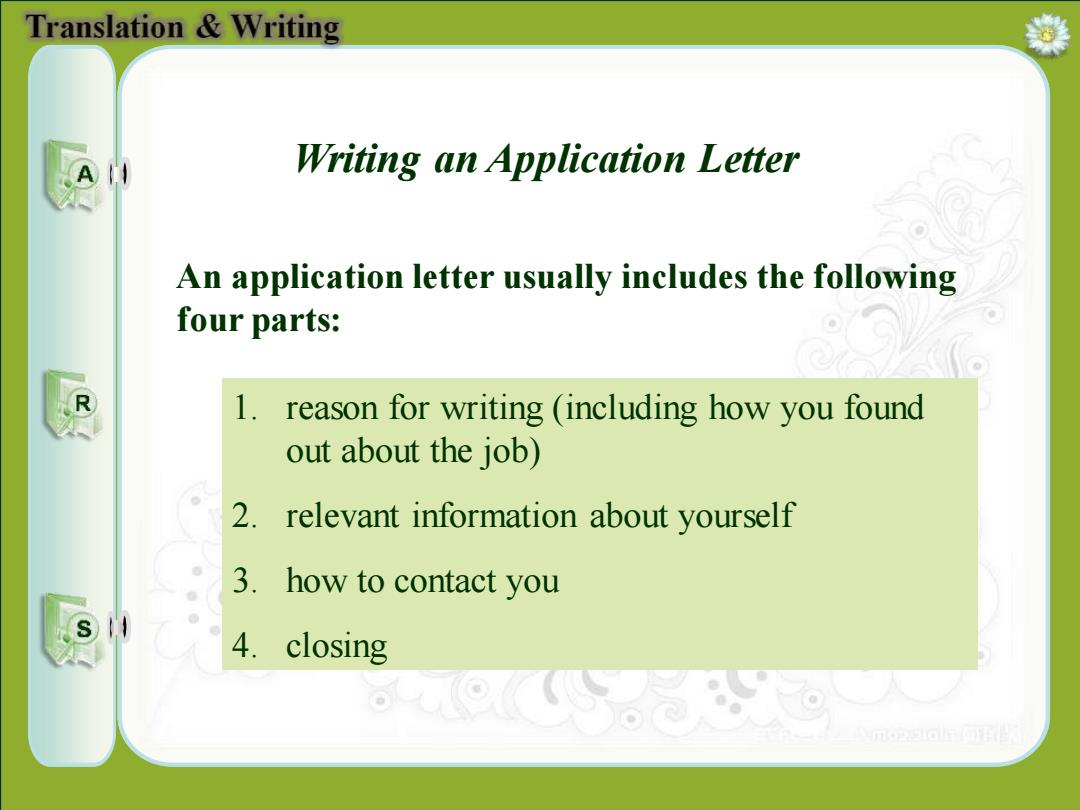
Translation Writing Writing an Application Letter An application letter usually includes the following four parts: R 1.reason for writing (including how you found out about the job) 2.relevant information about yourself 3.how to contact you 4. closing 抗2过百用
Writing an Application Letter An application letter usually includes the following four parts: 1. reason for writing (including how you found out about the job) 2. relevant information about yourself 3. how to contact you 4. closing